Week beginning 28 February 2022
Welcome back. Sorry you can’t be in school this week. Here are a range of resources linked to what is happening in class. Don’t forget to get in touch with your class teacher if you need support.
Maths
Follow this sequence of maths learning which is linked to algebra.
Lesson 1: video, worksheet, answers
Lesson 2: video, worksheet, answers
Lesson 3: video, worksheet, answers
Lesson 4: video, worksheet, answers
Lesson 5: video, worksheet, answers
Lesson 6: video, worksheet, answers
Lesson 7: video, worksheet, answers
Lesson 8: video, worksheet, answers
Lesson 9: video, worksheet, answers
Lesson 10: video, worksheet, answers
You don’t have to print the worksheet. Your child can write or draw their answers on paper. Your child’s learning will be most effective if you sit with them to pause the clip and check / praise / support your child as the clip moves on.
Practise times tables on Times Table Rockstars, too. Email the class teacher if you need your child’s login and password details.
(Suggested time: 30 minutes of Maths and 15 minutes of Rockstars daily)
Spelling
Look on the homework page to find this week’s spellings. They should choose some past spellings that they feel less confident with. Your child should complete one task each day.
- Day 1: Generate more words linked to the spelling pattern or ‘rule’. You could look out for the words in the book you’re reading at home, or any other text, like a website linked to our science topic of Living Things and their Habitat.
- Day 2: Practise the spellings using two of the ideas in our Super Spelling Strategies guide. (Set yourself and others at home a challenge of using some of the words when you’re speaking, too!)
- Day 3: Write separate sentences, each containing one of the spellings. (Don’t forget to show off really neat handwriting and make sure you sentence starts with a capital letter and ends with a full stop, exclamation mark (!) or question mark (?).
- Day 4: Repeat Task 2 or 3.
- Day 5: Get an adult at home to test you on your spellings. Practise any you spell incorrectly – you could write them out carefully until you’re sure.
(Suggested time: 15-20 minutes daily)
Reading fluency.
This is the text we’re using in school. It’s some top tips to stay safe online.
In school, we generally follow this sequence:
- Day 1: Read the text aloud with your child listening. Read it clearly and slowly, pointing to each word as you read. Have a chat about any unfamiliar words.
- Day 2: Read aloud each sentence (a full short sentence or part of a longer sentence), and have your child read it back to you. Do this ‘echo reading’ for the whole text.
- Day 3: Read the text and talk about the effect of the punctuation on how you read it – pauses for full stops and expression for exclamations (!) or questions (?). Your child reads the text aloud.
- Day 4: Read together with expression (just like you practised on Day 3).
- Day 5: Your child reads independently and fluently.
(Suggested time: 15 minutes daily)
Reading comprehension
We’ll be using this RIC text in class to practise comprehension skills. RIC stands for:
- Retrieve: finding information in a text
- Interpret: using clues in the text to unlock information
- Choice: thinking about the author’s choice of words, techniques or organisation that make the text interesting and enjoyable to read
This half term we’ll be reading a range of fiction and non-fiction texts about computing and online safety. Here’s a series of lessons based on A Career in Computer Games by Anthony Horowitz. There’s a whole series of lessons, but start at Lesson 1 and work through, doing one (or maybe even two) each day. If you’re self-isolating in your second week, try these poetry lessons on The British by Benjamin Zephaniah (Suggested time: 30 minutes daily)
Writing
In writing, be learning how to write a set of instructions for a computer game. Follow these lessons on instructional writing. There’s a whole series of lessons, but start at Lesson 1 and work through, doing one (or maybe even two) each day. (If you’re self-isolating in your second week, stick with the series of lessons you’ve already started and aim to complete the full series.)
(Suggested time: 30-40 minutes for each)
Topic
Our topic this half-term is computing.
Follow these lessons on selection in quizzes from Oak Academy. Follow the lesson sequence. It has 6 lessons so you could do three a week.
(Suggested time: 30-40 minutes)
Science
Last half term our topic was evolution.
These six lessons from Oak National Academy link closely to what we’ve been doing in class last half term. Start at Lesson 1 and work through, doing two or three in the week. If you’ve previously completed one of these lessons, have a go at the ones you haven’t completed yet.
If Science really motivates your child, you could also use look at these lessons all about practical Science.
(Suggested time: 30-45 minutes)
PE
Don’t forget to do some daily exercise!
Do two or three of these Five Minute Moves from Joe Wicks each day – spread them across the day as if they were playtimes, maybe!
Try working through this series of 25 lessons from the Association for Physical Education – do two or three in the week.
(Suggested time: 5 minutes daily, plus 30 minutes for the longer PE lessons)
Extra stuff…
As an extra (or as an alternative, if this helps to motivate your child)…
Geography isn’t a topic-driver this half-term, but you could brush up on your locational knowledge – something that was missed when schools closed earlier this year. You could explore some online maps and try to memorise some new countries, capitals, rivers and mountain ranges. These three lessons about Europe are worth checking out.
What about some Living and Learning? While you’re away from school, you could check out these lessons on money!
Week beginning 28 February 2022
Welcome back. Sorry you can’t be in school this week. Here are a range of resources linked to what is happening in class. Don’t forget to get in touch with your class teacher if you need support.
Maths
Follow this sequence of maths learning which is linked to fractions.
Lesson 1: video, worksheet, answers
Lesson 2: video, worksheet, answers
Lesson 3: video, worksheet, answers
Lesson 4: video, worksheet, answers
Lesson 5: video, worksheet, answers
Lesson 6: video, worksheet, answers
Lesson 7: video, worksheet, answers
Lesson 8: video, worksheet, answers
Lesson 9: video, worksheet, answers
Lesson 10: video, worksheet, answers
You don’t have to print the worksheet. Your child can write or draw their answers on paper. Your child’s learning will be most effective if you sit with them to pause the clip and check / praise / support your child as the clip moves on.
Practise times tables on Times Table Rockstars, too. Email the class teacher if you need your child’s login and password details.
(Suggested time: 30 minutes of Maths and 15 minutes of Rockstars daily)
Spelling
Look on the homework page to find this week’s spellings. They should choose some past spellings that they feel less confident with. Your child should complete one task each day.
- Day 1: Generate more words linked to the spelling pattern or ‘rule’. You could look out for the words in the book you’re reading at home, or any other text, like a website linked to our science topic of Living Things and their Habitat.
- Day 2: Practise the spellings using two of the ideas in our Super Spelling Strategies guide. (Set yourself and others at home a challenge of using some of the words when you’re speaking, too!)
- Day 3: Write separate sentences, each containing one of the spellings. (Don’t forget to show off really neat handwriting and make sure you sentence starts with a capital letter and ends with a full stop, exclamation mark (!) or question mark (?).
- Day 4: Repeat Task 2 or 3.
- Day 5: Get an adult at home to test you on your spellings. Practise any you spell incorrectly – you could write them out carefully until you’re sure.
(Suggested time: 15-20 minutes daily)
Reading fluency.
This is the text we’re using in school. It’s some top tips to stay safe online.
In school, we generally follow this sequence:
- Day 1: Read the text aloud with your child listening. Read it clearly and slowly, pointing to each word as you read. Have a chat about any unfamiliar words.
- Day 2: Read aloud each sentence (a full short sentence or part of a longer sentence), and have your child read it back to you. Do this ‘echo reading’ for the whole text.
- Day 3: Read the text and talk about the effect of the punctuation on how you read it – pauses for full stops and expression for exclamations (!) or questions (?). Your child reads the text aloud.
- Day 4: Read together with expression (just like you practised on Day 3).
- Day 5: Your child reads independently and fluently.
(Suggested time: 15 minutes daily)
Reading comprehension
We’ll be using this RIC text in class to practise comprehension skills. RIC stands for:
- Retrieve: finding information in a text
- Interpret: using clues in the text to unlock information
- Choice: thinking about the author’s choice of words, techniques or organisation that make the text interesting and enjoyable to read
This half term we’ll be reading a range of fiction and non-fiction texts about computing and online safety. Here’s a series of lessons based on A Career in Computer Games by Anthony Horowitz. There’s a whole series of lessons, but start at Lesson 1 and work through, doing one (or maybe even two) each day. If you’re self-isolating in your second week, try these poetry lessons on The British by Benjamin Zephaniah (Suggested time: 30 minutes daily)
Writing
In writing, be learning how to write a set of instructions for a computer game. Follow these lessons on instructional writing. There’s a whole series of lessons, but start at Lesson 1 and work through, doing one (or maybe even two) each day. (If you’re self-isolating in your second week, stick with the series of lessons you’ve already started and aim to complete the full series.)
(Suggested time: 30-40 minutes for each)
Topic
Our topic this half-term is computing.
Follow these lessons on selection in quizzes from Oak Academy. Follow the lesson sequence. It has 6 lessons so you could do three a week.
(Suggested time: 30-40 minutes)
Science
Last half term our topic was evolution.
These six lessons from Oak National Academy link closely to what we’ve been doing in class last half term. Start at Lesson 1 and work through, doing two or three in the week. If you’ve previously completed one of these lessons, have a go at the ones you haven’t completed yet.
If Science really motivates your child, you could also use look at these lessons all about practical Science.
(Suggested time: 30-45 minutes)
PE
Don’t forget to do some daily exercise!
Do two or three of these Five Minute Moves from Joe Wicks each day – spread them across the day as if they were playtimes, maybe!
Try working through this series of 25 lessons from the Association for Physical Education – do two or three in the week.
(Suggested time: 5 minutes daily, plus 30 minutes for the longer PE lessons)
Extra stuff…
As an extra (or as an alternative, if this helps to motivate your child)…
Geography isn’t a topic-driver this half-term, but you could brush up on your locational knowledge – something that was missed when schools closed earlier this year. You could explore some online maps and try to memorise some new countries, capitals, rivers and mountain ranges. These three lessons about Europe are worth checking out.
What about some Living and Learning? While you’re away from school, you could check out these lessons on money!
Happy half term
Our focus book this week has been The Gingerbread Man and the children have really enjoyed listening to the story. We have re-told the story using props and have included gingerbread men in our learning. We’ve even decorated some gingerbread biscuits to take home! The children have also been busy making their own musical instruments, creating fabulous junk-models, mixing beautiful gingerbread colours and drawing around their outlines to make ‘people patterns’. We have revisited ‘heaviest’ and ‘lightest’ in our maths and have checked our predictions using balance scales. We found out that larger objects are not always heavier than smaller ones.
After half term we’ll be celebrating Shrove Tuesday and we’ll also be dressing up for World Book Day. Which is your favourite character from a book?
All of the Nursery staff wish you a happy, healthy and safe half term. We look forward to seeing you all again on Tuesday, March 1st.

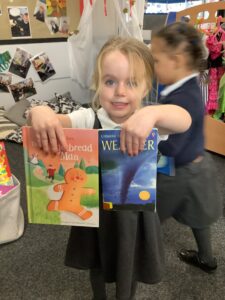
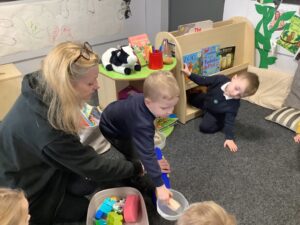
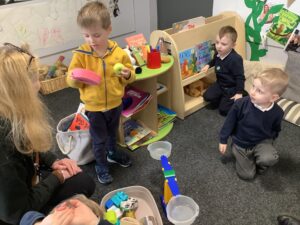
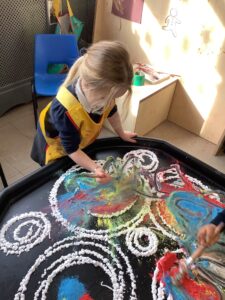
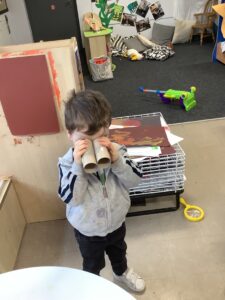
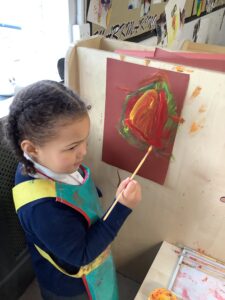
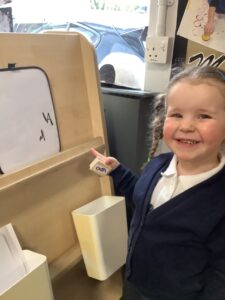
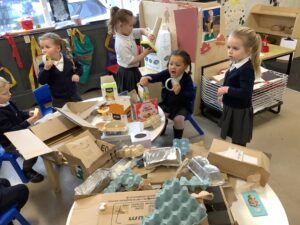
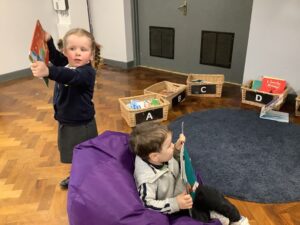

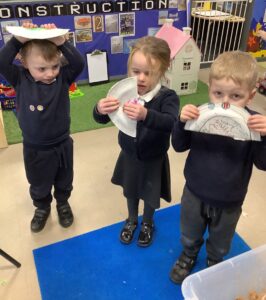
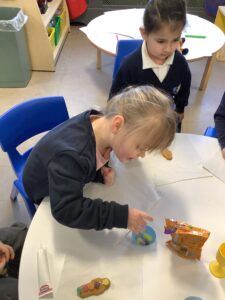
Reading
Today, some children enjoyed reading our class novel, Teddy Robinson, to the class. They used a clear voice and made sure they had good voice projection to make sure they were heard by everyone.
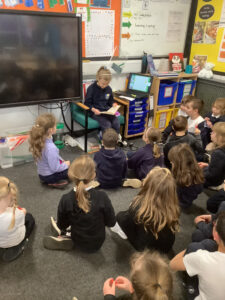


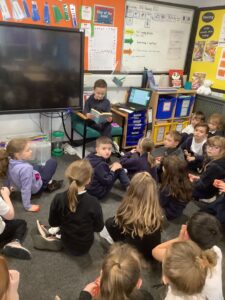
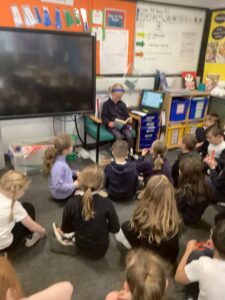
Handwriting Policy
In Year 1 and 2 we teach pre-cursive (year 1) and cursive writing (year 2). We suggested to many parents in parents evening that this would be a good thing to practise at home. Here is the handwriting policy to help you.
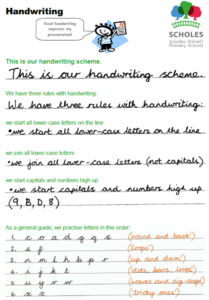
Superhero fun!
We’ve come to the end of a long and windy half-term. Over the past 7 weeks, we’ve laughed, had fun and seen lots of amazing learning!
To give you a flavour of our fantastic last week, I’ve made a video for you to watch at home with your child. I hope you enjoy!
Thank you to all of the parents who attended the parent-teacher meetings. It was lovely to share the children’s wonderful achievements.
Reminders
Training day – Monday 28 February
World Book Day – Thursday 03 March
I hope you all have a happy and healthy half-term.
This week’s message (Friday 18 February 2022)
Wow! With three half-terms done, we’re now half-way through the school year. Thanks to everyone who joined us for the parent-teacher meetings this week. This week’s message has lots of links to check out…
Is your child in Year 4? If so, they’ll be one of the first to do the new statutory Multiplication Tables Check. Read more about this.
We know what etiquette is – a sort of code for polite behaviour. What about netiquette? Have a chat with your child about this, and the other tips for online respect – especially important if your child has a mobile phone or other online device.
Talking of things online, have you heard about Roblox? If your child plays it online, you really should be aware of recent concerns, in the news this week.
Community Youth Summits (first held in 2015) help to influence how councillors have spent over £500,000 of Youth Activity Fund money. Local councillors have asked us to pass on an open invitation: to participate in their next Community Youth Summit for Harewood and Wetherby wards.
If you’ve a child with special educational needs or disabilities, these SEND workshops might be of interest.
Are you planning a day-trip next week? What about a visit to Temple Newsam – there’s a lot going on.
Whatever you get up to, have a happy and healthy half-term holiday!
e-books
Whilst transitioning to e-books your child has also been sent home a physical book to practice reading. Now that parents/children have been given sufficient time to adjust to e-books we will not be sending home a physical practice book to read. To practise reading at home your child will now use the e-books assigned using their Collins log in. Please get in touch if you are having trouble accessing e-books at home.
Internet Safety Talk

RE: Visiting a synagogue
During this half term, the children have been studying Judaism. We have discussed the meaning of promises and whether it is ever ok to break a promise. Following this, the children found out about a covenant.
A covenant is a special promise between God and people.
I think you should never break a promise.
People won’t trust you if you break their promise.
You will be letting someone down.
Don’t agree to a promise if you know that you won’t be able to keep it.
We have learnt about Moses and why he is an important key leader in the Jewish tradition. The synagogue is an important place of worship and community in Judaism and we were lucky to be able to go and visit one in Leeds.
We were very proud of how respectful and polite the children were during this visit. The children were able to ask questions about the Jewish customs and beliefs. We found out that the role of the Rabbi is to guide and support the Jewish community, the Torah is a sacred text, the festival of Pesach and the weekly celebration of Shabbat. The children were given opportunities to explore and examine religious artefacts and texts.

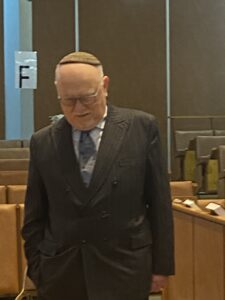
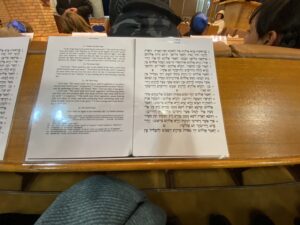

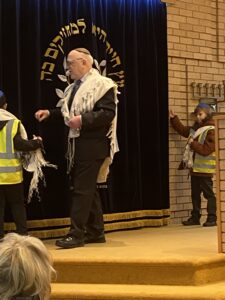
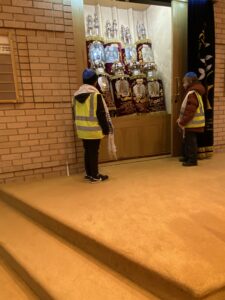
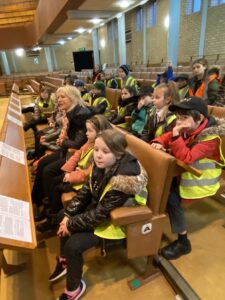
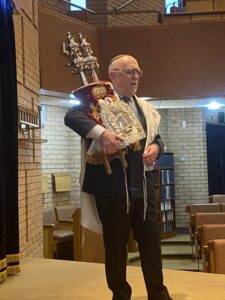
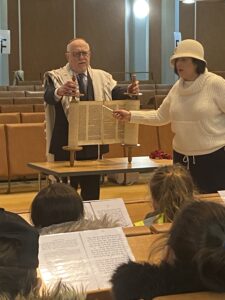
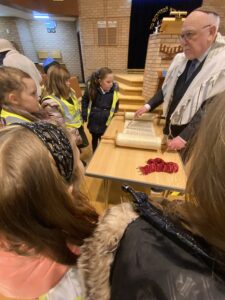
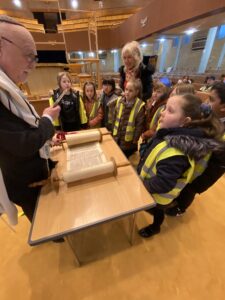
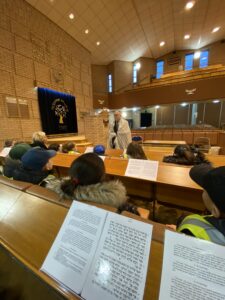
Ask your child to tell you about the pictures. What can they remember about the visit?
Well done and thank you to Year 3 and Year 4. It was an absolute pleasure to take you all out of school for an exciting and enjoyable visit to the synagogue.